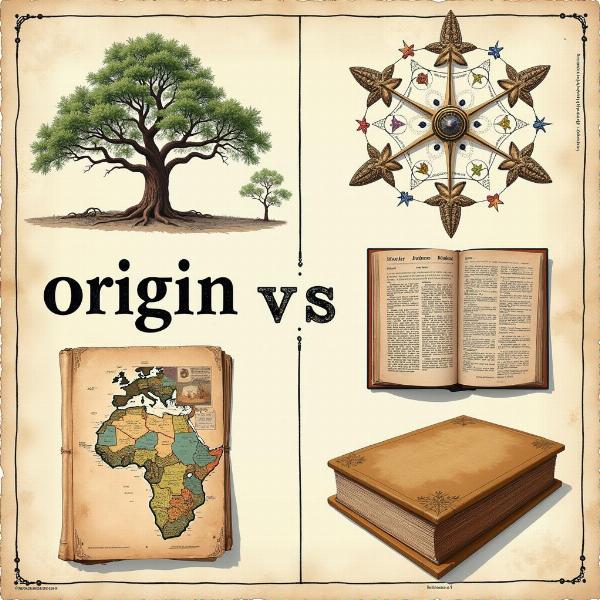Understanding the meaning of “origin” in Hindi is crucial for anyone navigating the rich tapestry of Indian languages and culture. Whether you’re translating documents, learning Hindi, or simply exploring the nuances of the language, grasping the various Hindi equivalents of “origin” can unlock a deeper understanding of its context and usage. This article will delve into the diverse ways “origin” is expressed in Hindi, offering practical examples and insights into its cultural significance.
Exploring the Hindi Translations of “Origin”
The English word “origin” encompasses several related concepts, including source, beginning, root, and ancestry. Consequently, several Hindi words can accurately translate “origin,” depending on the specific context. Some of the most common translations include:
-
उत्पत्ति (utpatti): This is perhaps the most direct translation of “origin” and refers to the act of coming into being, birth, or creation. It’s often used in a scientific or philosophical context, such as discussing the origin of the universe or the origin of life.
-
मूल (mool): This word signifies “root,” “foundation,” or “basis.” It’s often used to denote the origin of something in a more fundamental sense, like the root cause of a problem or the origin of a tradition.
-
आरंभ (aarambh): Meaning “beginning” or “commencement,” this word emphasizes the starting point of something. It can be used interchangeably with “origin” in some cases, particularly when referring to the origin of a project or event.
-
उद्गम (udgam): This term refers to the “source” or “place of origin” of something, often related to a river, spring, or other natural phenomena. It can also be used metaphorically to describe the origin of an idea or concept.
-
वंश (vansh): Meaning “lineage” or “dynasty,” this word relates to ancestry and familial origins. It’s particularly relevant when discussing family history or the origin of a particular clan or community.
Using “Origin” in Different Contexts: Hindi Examples
Let’s explore how these Hindi translations of “origin” are used in different contexts:
-
“What is the origin of the universe?” – ब्रह्मांड की उत्पत्ति क्या है? (Brahmaand kee utpatti kya hai?)
-
“The origin of this custom is unknown.” – इस रिवाज का मूल अज्ञात है। (Is rivaaj ka mool agyaat hai.)
-
“The origin of the river Ganges is in the Himalayas.” – गंगा नदी का उद्गम हिमालय में है। (Ganga nadi ka udgam Himalaya mein hai.)
-
“He traced his family’s origin back to a small village in India.” – उसने अपने परिवार के वंश का पता भारत के एक छोटे से गाँव तक लगाया। (Usne apne parivaar ke vansh ka pata Bharat ke ek chhote se gaon tak lagaya.)
-
“The origin of the project was a simple idea.” – परियोजना का आरंभ एक साधारण विचार से हुआ। (Pariyojana ka aarambh ek sadharan vichar se hua.)
Why Understanding “Origin in Hindi Meaning” is Important
A nuanced understanding of “origin” in Hindi is vital for accurate translation and effective communication. It allows you to choose the most appropriate Hindi word based on the specific context and avoid misinterpretations. This knowledge is especially important for businesses operating in India, academics researching Indian culture, and anyone seeking a deeper understanding of the Hindi language.
 Origin in Different Contexts
Origin in Different Contexts
Conclusion: Mastering the Nuances of “Origin” in Hindi
Whether you’re exploring the utpatti of the universe or tracing your family vansh, understanding the various Hindi translations of “origin” enriches your understanding of the language and its cultural context. By mastering these nuances, you can communicate more effectively and gain a deeper appreciation for the richness of Hindi.
FAQ:
-
What is the most common Hindi word for “origin”? Utpatti is generally the most common and direct translation.
-
Can “mool” and “udgam” be used interchangeably? While both relate to origin, mool emphasizes the root or foundation, while udgam refers specifically to the source or place of origin.
-
How do I choose the right Hindi word for “origin”? The appropriate word depends on the specific context. Consider what aspect of origin you want to emphasize – the beginning, the source, the root, or the ancestry.
-
Is it important to know multiple Hindi words for “origin”? Yes, knowing multiple synonyms allows for more precise and nuanced communication.
-
Where can I learn more about Hindi vocabulary? Resources like online dictionaries, language learning apps, and cultural immersion programs can help expand your Hindi vocabulary.
Meaning-Hindi.in is your trusted partner for all your Hindi translation needs. We offer a wide range of professional translation services, including business and commercial document translation, certified and legal document translation, technical and user manual translation, website and localization translation, educational and academic document translation, express translation, and specialized translation services. Contact us today for accurate and culturally sensitive translations. Email: [email protected] Phone: +91 11-4502-7584. Meaning-Hindi.in is committed to bridging the language gap and facilitating seamless communication.